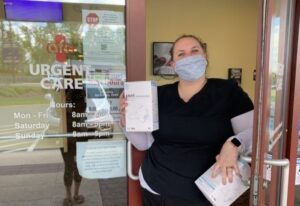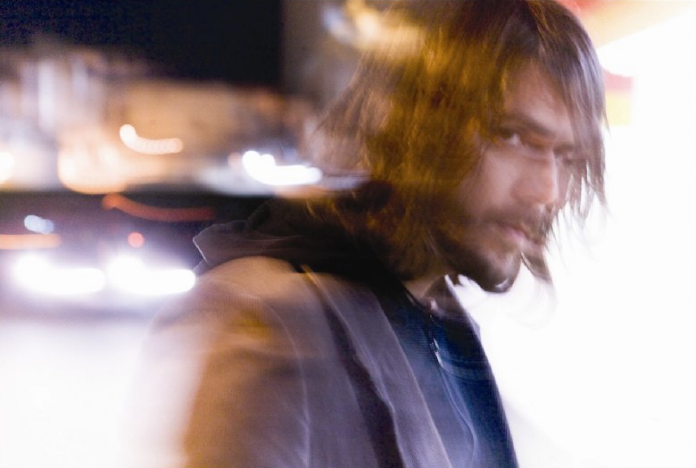Cary Brothers knows a thing or two about providing the soundtrack for dramatic medical situations.
So, it was fitting the singer-songwriter known for his music on shows like Grey’s Anatomy played a few songs to help a group of third-year students at Virginia Tech Carilion School of Medicine raise funds to support health care workers during the COVID-19 pandemic.
“My brother and sister-in-law live in Roanoke, and my nieces grew up there, so I have a special connection with that city,” said Brothers, who lives in Los Angeles. “When my brother reached out about performing to help raise money to get PPE for local health care workers, it took me all of one second to say, ‘Yes.’”
Brothers’ performance capped more than a dozen musical acts featured in the Southwest Virginia Covid-19 Response Force’s online open mic night fundraiser, on April 17. The group, founded by a handful of third-year medical students, raised more than $1,100 in donations and T-shirt sales that night, which have helped fund 1,000 FDA-approved KN95 masks and 500 surgical masks for local health care professionals.
“It was a wonderful way to interact with the greater Roanoke, southwestern Virginia community and the live music scene here while supporting our cause,” said Ayesha Kar, a third-year student.

To date, the group has collected more than $4,000 in donations, which has been used to purchase personal protective equipment (PPE) from manufacturers for local medical professionals. They’ve also been able to collect and donate more than 26,000 pairs of gloves, 200 face shields, 1,525 surgical masks, 200 shoe covers, and 848 disinfectant items to eight different facilities in the Roanoke Valley.
The students’ pandemic response efforts began shortly after they were no longer allowed to go in hospitals to gain hands-on training, much of which occurs during the third year of medical school.
“It was definitely disappointing because we wait our whole lives to get to this part of medical school,” said fellow student, Grace Lee. “It left us with a lot of time on our hands and wanting to help.”
Channeling that desire to assist local health care workers, some of whom they had been working with prior to the outbreak, was sparked by a text from their classmate, Vaishnavi Sridhar.
“She actually asked our group chat about starting to help the residents and attending physicians with childcare and groceries,” Kar said.
As the statewide social distancing guidelines grew into a stay-at-home order, the students’ efforts evolved from helping out with general errands to raising funds and coordinating with businesses to get PPE for the workers.
They also decided to use their annual student open mic night as an online fundraiser for the effort and reached out to the broader VTC community for help putting together a lineup. The group email asking for help connected them with Becki Morrison, the lead vocalist with a regional band, Becki and the Boom Booms, and an occasional standardized patient with the medical school.
“I was in the unique position as working with the school and having a band, and also knowing all of these great musicians,” Morrison said. “I thought, if they’re struggling to pull together music for this fundraiser, I have the inside loop to that.”

With Morrison’s help, within 10 days the lineup was filled out with about 10 Roanoke-area musicians and three medical school students. Cary Brothers also learned of the fundraiser via a medical school employee and quickly signed on as the finale for the event, which had a goal of raising $1,000.
“Kudos to the students who put on this event,” Brothers said. “Their cause is noble, and the show was every bit as smooth and technologically sound as the online charity shows I’ve played in recent weeks run by music industry folks. I think the students did a great job, and I’m so happy they hit their goal.”
While the pandemic caused the students to miss out on learning experiences in the hospitals, they feel the experience fundraising and locating PPE has helped them learn many other valuable lessons.
“[We’re seeing how] how difficult it is to navigate the health care system,” Lee said. “This is really shining a light on the systemic issues within health care by showing us the challenges that we are forced to face during a pandemic. We are learning how to promote public health as well as advocate for the safety of health care workers.”
And being located in Roanoke has also helped enlighten them to health care related disparities that exist between localities.
“We’ve seen how an emergency situation of this scale impact communities and how rural voices get lost,” Kar said. “When there’s a global lack of PPE, we’re almost at the bottom of the totem pole, even though our patients continue to get sick. We have similar needs, but not as many resources.”
— Travis Williams

